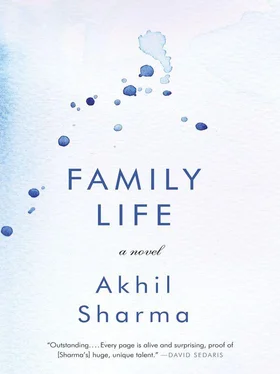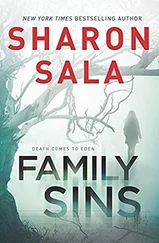The second drink came. My father drank this quickly, too, and asked for a beer. As we waited, he put his elbows on the bar. “I never thought this would be my life,” he said.
The sun was setting when we left the bar. The air was moist and cold. In the car, my father rolled down his window.
AROUND THANKSGIVING, THE insurance company said that it would pay for a nursing home. No one was happier to hear this than my aunt. “There is no point in denying what has happened, Shuba. We have to keep trusting God. We can’t just trust God when he’s doing what we want. We have to trust him even when things are not as we would like them.”
In December, my aunt’s only grandson turned one. She had a birthday party for him and didn’t tell us. When we came home from the hospital the night of the party and saw people sitting in the living room eating cake from paper plates, my aunt led us back into the kitchen. She said, “I thought it would depress you, seeing other people’s happiness.”
“Are you other people?” my mother said. “Is your happiness not my happiness?”
“Have some cake,” she said. “What is there to be angry about? I made a mistake.” As my aunt walked out of the kitchen, she said, loud enough to be heard by the guests, “I feel like I’m in court. Every word I have to watch.”
Two weeks later, my mother told me that we were moving to a new home in New Jersey.
AS CHRISTMAS DREW near, a Christmas tree appeared in the hospital’s lobby, and the hallways began to have cutouts of Santa on his sleigh taped to the walls. I began praying whenever I thought of it — at my locker, during lunch, even in the middle of a quiz. I prayed more than I had ever prayed before, but I found it harder and harder to drift into the rhythm of sung prayers or into the nightly conversations with God. How could chanting and burning incense undo three minutes of a sunny August afternoon? It was like trying to move a sheet of blank paper from one end of a table to the other by blinking so fast that you started a breeze.
On Christmas Eve, my mother asked the hospital chaplain to come to Birju’s room and pray. She and I knelt with the priest beside Birju’s bed. Afterward, the chaplain asked my mother whether she would be attending Christmas services the next morning. “Of course, Father,” she said.
“I’m coming, too,” I said.
That night, I watched It’s a Wonderful Life on television in the living room. To me, the movie meant that if you become unhappy enough, almost anything can pass as happiness. Later, when I lay down near my parents and closed my eyes, God appeared.
A part of me felt that God would have to grant whatever request was made of him on his son’s birthday. “Will Birju be better in the morning?”
“No,” God answered.
“Why not?”
“When you asked for the hundred percent on the math test, you could have asked for your brother.”
The next morning, when I arrived at the hospital with my mother and father, Birju was asleep, breathing through his mouth while a nurse’s aide stood by the hospital bed, pouring a can of Isocal formula into his G-tube, the yellowish rubber hose that went into his stomach. I hadn’t expected Birju to be better; still, seeing him this way made my chest very heavy.
All day, I sat in a corner of Birju’s room. My mother sat by the hospital bed and read women’s magazines to Birju while she shelled peanuts into her lap. My father was reading a thick red book in preparation for a civil-service exam. The day wore on. The sky outside grew dark. At some point, the lights were turned on, and at the idea of the day being over and nothing having changed, I started crying. I tried to be quiet. I did not want my parents to notice my tears and think that I was crying for Birju, because in reality I was crying for myself, for having to spend so much time in the hospital, for now having to move to a town I didn’t know.
My father noticed first. “What’s the matter, hero?”
My mother shouted, “What happened?” She jumped up. She looked so alarmed that it was as if I were bleeding.
“I didn’t get any Christmas presents. I need a Christmas present,” I said. “You didn’t buy me a Christmas present.” And then, because I had revealed my selfishness, I let myself weep. “You have to give me something. I should get something for all this.” I clenched my hands and wiped my face with my fists. “Each time I come here, I should get something.”
My mother pulled me up and pressed me into her stomach. My father came and stood beside us. “What do you want?” he said.
I didn’t know.
“What do you want?” my mother repeated.
“I want to eat pizza, and I want candy.”
My mother stroked my hair. “Don’t worry, baby.”
I sobbed, and she kept wiping my face with a fold of her sari. At last I stopped crying, and she and my father decided that I should be taken back to my aunt’s.
On the way, we stopped at a strip mall. It was a little after five, and the streetlights were lit. First, my father and I went to a magazine shop and bought a bag of 3 Musketeers bars and a bag of Reese’s Peanut Butter Cups. Then we went next door to a pizza shop. We sat in a booth and kept our coats on as we ate. Since the accident, I had said a quick prayer whenever I ate. Now I wondered whether to pray. It seemed that I should still do everything possible to help Birju. I brought my hands together over the paper plate.
Later, in the car, I held the bags of candy in my lap while my father drove in silence. Even through the plastic, I could smell the sugar and chocolate. Some of the houses we passed were dark. Others were outlined in Christmas lights.
The car was warm and after a while, I rolled down the window slightly. The car filled with roaring wind. We approached the apartment building with the pool where Birju had had his accident. Because of the lights in the parking lot where the ambulance had stood, I could see the tall fence that guarded the pool. I tried to see past the fence into the dark beyond. I wondered what had happened to the pool’s unlucky water after the accident. Had it been drained? Probably it had not. All summer long, people must have swum in the pool and sat on its sides, splashing their feet in the water, and not known that my brother had lain for three minutes on its concrete bottom one August afternoon.
We stood in my aunt’s driveway with our luggage in the car. “What has happened?” she sobbed. “What has God done?” As she and my mother hugged, my aunt clutched at her and would not let go. My mother gripped my aunt too and wept. My uncle was there. He put a hand on my shoulder, and I wanted to shrug it off. I was shivering, and my coat was in the car. Why hadn’t people been nicer when it mattered? I wondered.
ON MY FIRST day in the nursing home, I sat by Birju’s bed and read to him from an old issue of Chandamama . It was raining and drops clicked off the windows. The room was about the size of the one in the hospital. Even with the ceiling lights on, it was dim. My mother kept walking in and out of the room. She was busy doing paperwork. When she entered, I continued reading without looking up. I had the sense that I was being watched, that we were providing evidence to the nursing home. I needed to show that my family was admirable and that we cared about Birju. I felt that if I did this, it would shame the people at the home to take good care of my brother.
I began to ache from sitting on the hard chair. My voice got hoarse. At the hospital, I would have said, “Birju, let’s watch some TV.” More hours passed. I was conscious of how quiet the nursing home was. The door behind me was open. When a cart went by, I could hear its wheels hissing along the linoleum. At the hospital, there were always nurses and doctors hurrying about. The PA system regularly came on. The quietness made me feel that the home was not as good as the hospital, that the nursing home was where the world put people who were not important, people who could be put away someplace and forgotten. I began to feel that we had let Birju down, that by letting him be moved here, we had not taken care of him.
Читать дальше












